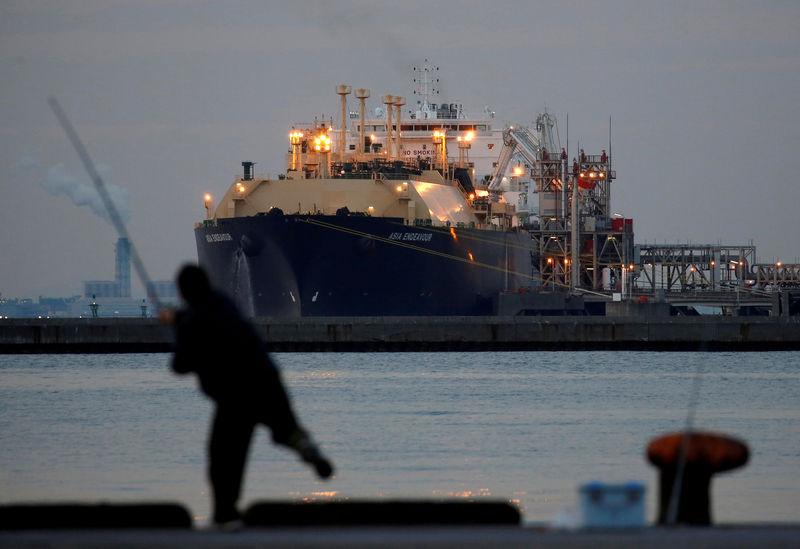By Osamu Tsukimori and Aaron Sheldrick
CHIBA, Japan (Reuters) - Producers of liquefied natural gas (LNG) have shot themselves in the foot with oversupply, and face calls for flexibility and greater competition from other fuels that may force them to take more risks and start trading just like other commodity dealers.
That's a big change for a market long dominated by large producers such as Royal Dutch Shell (L:RDSa) and BP (L:BP) who provide major importers with fixed volumes under multi-decade contracts linked to the price of oil (LCOc1).
Under the protection of these lucrative locked-in deals, producers in Australia, Qatar, Russia and elsewhere went on an investment spree that left them with a huge supply overhang when demand in China and India developed more slowly than expected.
That, together with rising fuel competition from coal and renewables, contributed to a more than 70 percent crash in spot Asian LNG prices
"The LNG market is changing rapidly, (and) the large volume long-term contracts that traditionally underpinned the development of the industry are today much more difficult to obtain," said Steve Hill, executive vice president of Shell Eastern Trading, during a gas conference in Japan on Wednesday.
"LNG projects ... need to take more market risks," he said.
In a sign of what might be ahead, Japan's JERA - the biggest single importer of LNG - and France's Total SA (PA:TOTF) are set to strike its first deal soon with flexible volumes that are based on Asia LNG spot prices.
JERA's chief fuel transactions officer, Hiroki Sato, confirmed the imminent deal to Reuters on Wednesday in an interview at the Gastech conference.
"There is no price war, but there is clearly competition under way to create a structure that answers the varying buyer needs," he said.
Total did not respond to queries for comment on the deal.
Another thing about to change is that trading specialists - who buy commodities from producers to sell on to importers at a profit and who have so far played a smaller role in LNG than they do in oil or coal - are jumping into the game.
"People need to sit in the middle of the chain (to) provide the flexibility and meet the different customer needs," said Mike Utsler, chief operations officers for Australia's Woodside Petroleum (AX:WPL).
Preparing to do just that, commodity merchant Trafigura [TRAFG.UL] this week launched a standard master sales and purchase agreement (MSPA) for LNG trade, something already well established in other commodities.
"The industry is moving to a situation where you can't just be a seller or a marketer or a trader," said Kerry Anne Shanks, head of gas and LNG Research in Asia at energy consultancy Wood Mackenzie. "You need to have middlemen positions."
Shanks also noted as an example of changes in the industry how buyers such as JERA are starting to trade gas.
UNLOCKING NEW MARKETS
Woodside, which operates several large LNG export facilities and is developing more, said producers also had to create new markets amid oversupply.
"There's a big opportunity for much smaller scale demand ... Big, long-term contracts are not necessary in order to supply (such projects)," Utsler said.
The thinking is similar at Shell. "We are trying to unlock new gas markets ... by initiating new small-scale LNG import terminals," Hill said.
Smaller scale demand could come from new importers like Pakistan, which only started using LNG in the last two years, or from new sectors like transportation.
Singapore's Pavilion Energy this week signed a memorandum of understanding with Total to supply the French energy major with LNG used as a ship fuel.
But LNG producers need to keep a watch on competition. Oil still dominates transportation, and cheap coal - seen by many as outdated due to high pollution levels - is still the biggest fuel source for electricity, especially in fast-growing Asia.
Wind and solar energy are also becoming competitive.
"Coal won't completely disappear. It will continue to be a competitor and a provider of energy solutions, as will renewables," said David Knipe, head of international gas at BP's integrated supply and trading unit.
Still, the market should not expect producers and suppliers to subject themselves to market whims, competition and geopolitics on large-scale projects, said Elizabeth Spomer, executive vice president at Toronto-listed Veresen Inc (TO:VSN) and head of its Jordan Cove LNG project in Oregon.
"Even the international oil companies that have the big balance sheets are not going to make final investment decisions without long-term take or pay contracts," she said, noting that such projects represent billions of dollars of "price risk".
